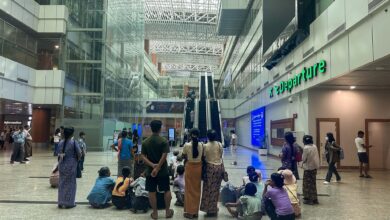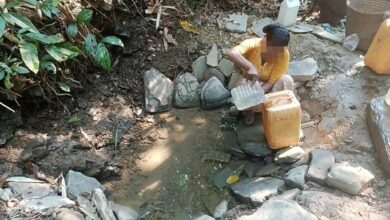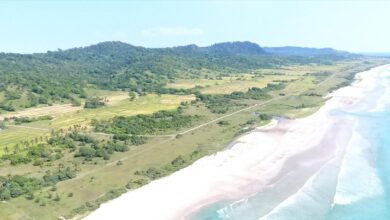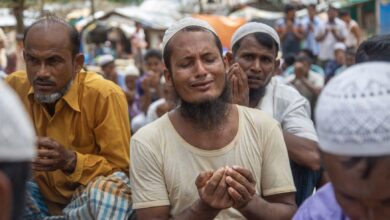
Yangon resident Hlaing Htwe* takes out an old inverter to make sure that his family has light after the sun goes down. It has been 10 years or more since he last had to use it regularly. Now, however, it has once again become a part of his everyday life.
For the 52-year-old film editor, the return of chronic blackouts in Myanmar’s largest city is not just an inconvenience. It is also a reminder of a time when powerlessness was the norm for most in the country.
This came home to him recently when he heard his 10-year-old son shout out with joy when the power suddenly returned after an hours-long outage. The sound immediately brought back memories of his own childhood, when he had reacted in the same way whenever the lights came back on.
“What has changed since that time?” he asked himself. “Maybe nothing.”
More than a year after Myanmar’s latest military coup, many have begun to wonder if they, or their children, will ever see an end to their country’s political and economic misery.
While resistance to the military takeover has been fierce, some worry that as the hardships of ordinary people deepen, most will revert to survival mode, adapting as best they can to a “new normal” that is also strikingly like life under previous regimes.
This has prompted many, like Hlaing Htwe, to engage in a more subtle form of resistance—a refusal to accept the current situation as an inevitable return to the days of brutal repression and bare subsistence.
“There is no reason my son should be overjoyed when the power comes back on. Instead, we should be outraged when it goes out, because it just isn’t normal,” he says.


Waking to a nightmare
Hlaing Htwe admits that it isn’t easy, given Myanmar’s long history of repressive military rule and economic deprivation, to regard its brief era of relative freedom as the norm.
“It’s like there was a short period of peace that was just an illusion, and what we are seeing now is in fact the reality,” he says, referring to the “democratic transition” that began a decade ago when Aung San Suu Kyi, the leader of the National League for Democracy (NLD), was elected to parliament in a by-election in April 2012.
We went to bed on the night of January 31 with democracy and woke up on the morning of February 1 to a dictatorship
That event, which was followed three and a half years later by national elections that swept the NLD to power in a landslide victory, ushered in a revitalization of the pro-democracy movement that grew out of massive protests against military rule in 1988. It also effectively ended decades of international isolation that had turned Myanmar into one of the world’s poorest countries.
When the NLD won another resounding victory at the polls in 2020, however, it was apparently too much for the military to accept. In a replay of 1990, when a previous junta refused to recognise the NLD’s first win two years after the party’s creation, the generals once again seized power, claiming electoral fraud.
“We went to bed on the night of January 31 with democracy and woke up on the morning of February 1 to a dictatorship,” said Hlaing Htwe, recalling the suddenness of last year’s return to military rule.
“All gone”—that was the first thought that came to his mind when he heard that the elected NLD government had been overthrown.
Once he got over the shock, and as protesters turned out in huge numbers all over the country, he convinced himself that the coup would fail. But as someone who had taken part in the 1988 uprising as a first-year university student, he also felt a growing unease about how the situation would unfold.
“It’s because of our generation’s trauma,” he said.

His fears soon proved well-founded, as the regime wasted no time in turning to violence to suppress opposition to its rule, just as its predecessors had done.
As the crackdowns grew more and more savage with each passing week, and as weeks turned to months, opponents of the regime continued to hold their ground, both through the non-violent Civil Disobedience Movement and by resorting to armed resistance.
Meanwhile, others not directly involved in the anti-coup movement struggled on other fronts.
For some, life soon became significantly harder. Even those who didn’t suffer any drastic change in their circumstances at first, like Hlaing Htwe, began to feel the squeeze.
Mostly, however, it was the crush of memories—of the days when he had to stand in line to buy necessities such as rice, oil and candles at government stores—that oppressed Htwe Hlaing as economic conditions worsened.
Now that he has to use an inverter attached to a car battery to ensure that he has at least some power in his home at night, he is reminded of how his father used to gas up the family car just so they could sell the fuel to pay for household expenses.

“It seemed like a perfectly normal thing to do at the time. Nobody ever questioned why it was necessary in the first place,” he said.
He hastened to add that his own situation was not nearly as bad as that facing many others. “But I can see where this is heading,” he said.
Working-class woes
For Win Win*, a garment factory worker in Yangon’s industrial suburb Hlaing Tharyar, the reality of the situation hit harder and faster.
Originally from Sagaing Region, she came to Yangon five years ago in search of work. Ever since, she has lived in a workers’ dormitory, where she has a space of just 10’x10’ to call her own.
Since the coup, she has seen many others lose their jobs. This makes her grateful for the fact that she is still working. But even fully employed, she finds it difficult to survive, as prices for basic necessities continue to climb beyond her modest means.
To save money, most factory workers wake up early in the morning to prepare their own meals. After work they go to the markets to buy food to cook in their dormitories. Because of the power outages, many now have to use charcoal to do their cooking, which takes more time and energy than using electric stoves. If they are too exhausted at the end of the day, they buy food from vendors, which eats into their tight budgets.

“If the power comes on in the middle of the night, we all get up to cook while we can, because there is no guarantee that it will still be there in the morning,” she says, describing the disruptions that have become a regular part of her life since last year.
Even taking showers has become more difficult since the coup. Without a reliable supply of electricity, water can’t always be pumped into the dormitory.
“Some days we have no water for bathing. These are our ‘no shower’ days,” she says.
Taxi drivers are also taking a hit in the post-coup economy. As living expenses rise, more and more people are switching to buses or trains to get around. With gasoline now costing around 2,500 kyat ($1.40) a litre, driving around the city in the hope of picking up a fare is now prohibitively expensive.
When the authorities all start asking for tea money, you know the country is going backwards—way backwards
To make matters worse, checkpoints have become a common sight in Yangon since the coup, according to Min Min*, a taxi driver of many years’ experience.
What this means is that police and soldiers now have more opportunities to demand “tea money”—small bribes that were a ubiquitous feature of life under previous regimes.
“When the authorities all start asking for tea money, you know the country is going backwards—way backwards,” he said.
Clouds of doubt
It isn’t just the economy that is weighing people down. There is also a pervasive feeling of distrust that has crept back into everyday life. Teashops are once again places where you don’t express your views too freely.
“Between Covid and the coup, I don’t feel safe anymore when I sit down next to other people,” says Hlaing Htwe.
He says that every time he takes a seat in one of his favourite teashops, he finds himself examining the faces of other patrons. Instead of reading news journals—most have stopped publishing since the coup—he reads the expressions of strangers to try to guess if they are military informants or supporters of the regime.
Hlaing Htwe knows well what it feels like to live under a cloud of doubt about those around him—and about himself.
In 1988, he joined other students who fled to the jungle with the intention of taking up arms against the regime that had seized power that year. After a few months, however, he returned to Yangon when it became apparent that there was little support for armed struggle among ordinary people, who had seen for themselves how much violence the military was willing to inflict to stay in power.
He saw how people learned to adapt to this new reality after a brief moment of hope, when it seemed as if the country’s people might finally succeed in overthrowing their oppressors. Civil servants who had taken part in protests sheepishly returned to work. Celebrities who called for democracy started making propaganda for the junta. And rebels who returned from the jungle tried to make a living.


Hlaing Htwe says he is not proud of his decision to abandon the revolution when he was a young man. At the time, however, there didn’t seem to be any other choice, short of going into exile or ending up dead or in prison.
“The way the armed resistance has spread out across the country is something we didn’t even dare to imagine in our time,” he says.
As a father of two children, aged 10 and 15, he knows that joining the armed struggle again is not an option for him. But he continues to resist in other ways, by refusing to do what he did in the past—simply to fit in with the new order.
Now, when he passes schools and sees children in their green and white uniforms, he thinks it is “ridiculous” that any parent would entrust their children’s education to a junta that has slaughtered civilians and robbed the younger generation of its future. Like many others, he has boycotted the regime’s education system.
I will always remind myself who is responsible for this suffering in the first place
Again, he is reminded of the 1990s, when the junta then in control repeatedly closed schools and universities to punish students for resisting its rule.
This time, however, it is the parents and the students themselves who have decided to disrupt the military’s efforts to establish itself as the rightful ruler of the country, by staying away from any institution under its influence.
It isn’t easy for him to deprive his children of a chance to return to school, especially after a year of isolation imposed by the pandemic. But Hlaing Htwe is convinced it is the right thing to do.
“If the majority of the population is enduring, we will, too. I can’t just think of my children’s suffering. The whole country is suffering, and we are just a small part of it,” he says.
“And I will always remind myself who is responsible for this suffering in the first place,” he adds.
*Names have been changed for security reasons
Additional reporting by Han Thit.



